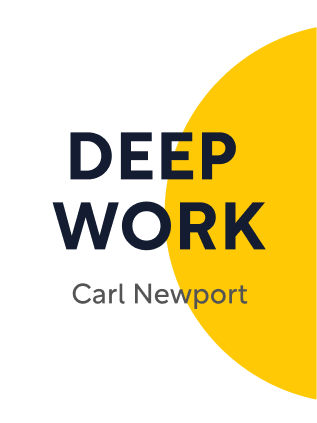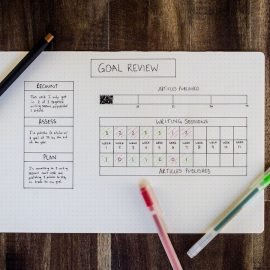

This article is an excerpt from the Shortform book guide to "Deep Work" by Cal Newport. Shortform has the world's best summaries and analyses of books you should be reading.
Like this article? Sign up for a free trial here .
Looking for Deep Work workouts to help you apply the book’s lessons to your life? How can deep work help you improve focus?
The best and most meaningful progress comes from deep work. Deep work is focused and undistracted work on a task that pushes your cognitive abilities. Here are six Deep Work exercises inspired by Cal Newport’s book to help you apply deep work principles to your life.
Continue below for six Deep Work book exercises.
Deep Work Book Workouts
When you’re trying to be productive, are you easily distracted by wandering thoughts or urges? Do you wish you could focus better, spending hours more per day driving toward your most important goals? Deep Work teaches you how to develop your focus and resist distractions. Focus is like a mental muscle – you need to structure training sessions and push yourself to your mental limit to increase your focus capacity. Implement the strategies in this Deep Work summary, and you’ll be more productive than you’ve ever been.
Here are six Deep Work workouts to help you reduce distractions and increase focus:
What’s Your Deep Work?
Think about what deep work means for you.
- In your line of work, what are your most important deep work tasks? These are the tasks that most advance you toward your goals and can be transformational. List each task, and why each one is important.
- How much time do you spend on deep work per week? Do you think this is enough?
- If you do deep work regularly, what major life goals should you be closer to achieving?
Your Greatest Distractions
Think about what takes you away from deep work.
- What shallow work fills up your schedule? What mindless tasks take up a lot of your time, but don’t move you meaningfully toward your goals? List each, and estimate how many hours per week they take.
- Aside from shallow work, what are your greatest distractions? What is most likely to interrupt you when you’re engaging in deep work?
Create Your Deep Work
Now that you know what enables effective deep work, let’s create your own deep work plan.
- Write down your specific personal schedule for deep work. (This could be specific blocks of time on specific days throughout the week, or multiple days each week/month. These should also be times when you have the greatest ability to focus.)
- In what specific location can you do deep work? Can you dedicate this location only to deep work, and not to shallow work? How will you remove distractions from this environment?
- What deep work are you going to focus on in your next session? What metric will you use to measure how effective your deep work was?
Increase Your Focus
If you increase your ability to focus, you’ll get more done in your deep work time. Here are three exercises to train your focus.
- Is it possible for you to schedule time blocks when you’re allowed to use the Internet, then stay offline the rest of the time? If no, why not, and how can you get around these problems?
- Look at an important task that you have to complete today or in the near future. What is the task, and how much time would this normally take? Then, if you had to set a more aggressive deadline that would force you to concentrate, what would that deadline be?
- Taking the idea of “productive meditation,” what is your next opportunity to mull over a complicated problem in a relaxed, distraction-free area? What problem will you think about? What are the important “variables” to pre-load into your head, so you won’t need to look at your phone or the Internet to make progress?
Reflect on Your Distractions
Try to align where you spend your time with your life’s most important goals with these workouts to deepen your work.
- What is one of your most important goals? It can be professional or personal. (Choose just one. You can redo this exercise for other goals.)
- What are the most important activities you can do to progress toward this goal? List no more than 3.
- List the major ways you spend your time that are supposedly in pursuit of this goal. These might include the Internet (websites, apps, tools) or activities offline. For each, answer: does using this contribute meaningfully to your most important goal above?
- If you think it’s a good idea, how can you shift time from the distractions to the most important activities?
Reducing Shallow Work
Take command of your schedule and reduce meaningless shallow work.
- If you were to constrain your worktime each day, when would you start, and when would you stop? Would you be able to get what you need done within this time?
- What shallow work doesn’t contribute to your organization’s goals? What could be a more effective replacement for that time?
- Considering your last answer, how can you communicate with your manager about making time for deep work and cutting out shallow work? Write out your talking points here. (Remember: start with high-level goals, how deep work contributes to the goals, then setting expectations for shallow work the mangaer may believe is important.)
- Pull up an email thread that wasted more time than it needed to. Find one of your replies that could have been more helpful. Paste it in. Now rewrite it, with the goal of reducing the number of replies needed. (Remember: articulate the current state of things, what the ultimate goal is, and what the most effective next steps are.)

———End of Preview———
Like what you just read? Read the rest of the world's best book summary and analysis of Cal Newport's "Deep Work" at Shortform .
Here's what you'll find in our full Deep Work summary :
- How deep work is critical for performance and productivity
- Why focus is like a mental muscle
- Why willpower isn't as good as a ritual






